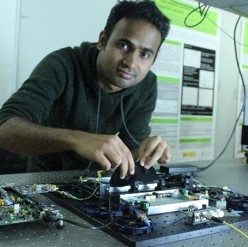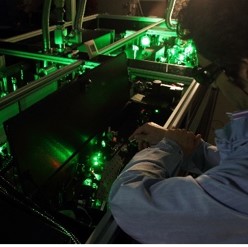ICFO decide game
Group 2 – Participant 1
Story cards
Read all the cards from this category, choose the one that looks more interesting to you and explain it to the rest of the group.
Jun jiang
Story Card 6
I wore glasses since I was a kid and I always wanted to be like my friends who could play sports and go to the pool without having sight problems. Two years ago I was able to have eye surgery to reduce my myopia and I can finally see the world directly and not through my glasses! And all thanks to the photons of an ultra-precise laser that allowed the surgeon to make incisions in my eyes with minimal risk.
health
stephan schultz
Story Card 8
I’m training to run the Barcelona Marathon. To improve my training, I bought a bracelet to monitor my heart rate at all times. The other day, flipping my bracelet, I noticed that there was a green light on the side that touches my wrist: as it couldn’t be decoration, I researched a bit on the internet and discovered that the wearable device gets the information about my pulse by measuring the green photons that interact with my skin.
information and cybersecurity
health
gerard grau
Story Card 15
This year I started the master's degree in Photonics in Barcelona. In one of the subjects, I discovered that photonics has a lot to do with my other passion: drones. If we fill these small planes with photonic sensors, we can get valuable information about places that would be difficult to reach. This makes drones not just fun toys, but important tools for studying the environment, searching for oil, gas, or mineral deposits, monitoring areas of natural disasters or crops.
information and cYberseCuriTY
info cards
Read all cards from this category, choose the two that look more interesting and explain them to the rest of the group.
quantum cryptography
Info Card 3
We share on a daily basis a lot of private information (personal, financial or health data) that could be intercepted: the cryptographic protocols that currently protect them would not work with more powerful computers in the future.
A solution could come from quantum physics: it allows you to design cryptographic protocols that would withstand the attacks of any computer (present or future). There are still many technological challenges to the integration of quantum cryptographic systems into the telecommunications network: solving them is the goal of CiViQ, a European Quantum Flagship project that ICFO coordinates and in which others research centers, universities and large and small companies participate, including Quside, an ICFO spin-off founded in 2017.
Photo: One of the ICFO laboratories where technologies for quantum cryptography are being developed
information and cybersecurity
detection of microorganisms in water
Info Card 7
We are used to going to the beach without worrying about illnesses, because there are entities such as the Catalan Water Agency (ACA - its acronym in Catalan) that monitor the water along the beaches, ensuring the safety of bathers. Thanks to photonics, on-site analysis within a few hours will soon be possible, significantly reducing waiting times for detecting the presence of harmful microorganisms.
For this reason, the ACA has agreed with ICFO to develop this technology to monitor the state of the Catalan beaches. This same technology could also be applied in the field of food safety and other industrial sectors.
energy and environment
photographing the movements of electrons
Info Card 21
To capture images of some very fast things (such as a bullet passing through an apple) it is essential to illuminate them with a pulse of light as fast as the scene that we want to capture. Thus, in order to observe the behavior of the electrons in some chemical reactions, it is necessary to send extremely fast light pulses.
So fast that one second would have to be divided by the number of seconds that have passed since the beginning of the universe to get its duration (a few attoseconds).
In one of ICFO laboratories, they are working on the generation of these pulses to study phenomena that can help improve the synthesis of chemicals or the performance of fuels or computers.
Photo: One of the ICFO lasers that can generate ultrafast pulses
photonics everywhere
artificial intelligence for the advancement of science
Info Card 25
We are used to movie or music platforms suggesting us what to watch or listen to next. This is possible because algorithms can learn, if we give them a series of initial examples: it is a branch of artificial intelligence called machine learning.
Apart from improving technological services, machine learning is also very useful for people looking for solutions to complex scientific problems. At ICFO we use artificial intelligence to find new strategies to solve complex quantum physics problems, predict the motion of individual particles (very important for biology), or increase computational speed (optimization) for some complex algorithms that apply to significant day-to-day problems.
information and cybersecurity
thinking cards
Read all the cards from this category, choose the one that looks more interesting to you and explain it to the rest of the group.
the value of science for society
Thinking Card 2
Having a basic knowledge of different scientific fields and understand how scientific knowledge is generated is important for all citizens. The COVID-19 pandemic is an example of this: it is easier to accept and correctly apply public health recommendations (and help curb the spread of the virus) if we understand the scientific reasons behind them and how policy makers got to these conclusions.
Even if everyone learns science during compulsory education, it is clearly not enough for society to value science and its results: how can we change that?
fundamental or applied research?
Thinking Card 5
It is not easy to predict when a particular technology will be available to society: for example, nuclear fusion has been close to solving the problem of energy production for years, but there have been always unforeseen technical issues that delayed its implementation. On the other hand, some technologies that are now ubiquitous, such as lasers, owe their origin to the curiosity about some fundamental questions, such as the interaction between photons and matter, without a specific application in mind.
How can we choose the research fields that will bring us the most benefits?
DECISIon
The time and resources available to solve important problems affecting society are limited. Imagine being part of the commission that has to decide how to invest the money for photonics research at European level for the coming years: knowing that photonics benefits society in many different ways, how would you distribute funds among the different research fields in photonics?
This is not an individual decision: each group must come to a unanimous conclusion by discussing correctly and rationally based on the facts that you have learned so far. There is no right or wrong answer. Like many things in life, it depends on the point of view you assume, the priorities you set, ...
light for health
Option 1
The pandemic that arose in 2020 taught us that public health is an important sector that affects many more aspects of society. A tiny virus can affect the lives of millions of people in all its aspects, not only health, but also the economy, industrial structure, labor market ...
That’s why it’s important to focus most of our efforts on research projects that can improve and care for people’s health.
light for information and cybersecurity
Option 2
We live in the information age. More and more companies and institutions are collecting and analyzing large amounts of data to improve industrial processes and services for the population. In addition, digital technologies are essential to communicate with each other, whether for work or fun. If information systems fail, strategic structures such as energy networks, traffic control, hospitals, governments, etc. fail, too. Thus, ensuring data security for quick and massive data transfer is of fundamental importance for a digitized society like ours.
That is why it is important to focus most of our efforts on research projects that can improve data collection, analysis, transmission and security.
light for energy and the environment
Option 3
We are in the middle of a climate emergency: to be able to solve it we need new environmental policies and the commitment of society as a whole. Science and technology can accelerate the change of paradigm that we need to save the planet with discoveries and innovative technologies. If we do nothing now, the Earth will be uninhabitable and unsustainable, but there’s still time.
That’s why it’s important to focus most of our efforts on research projects that can help us take care of our planet.
photonics everywhere
Option 4
Photonics is everywhere and has a positive impact in many different aspects of our lives. Sometimes, the same technology (such as the laser) can improve health, information and care for the environment at the same time. There are many global issues and it is difficult to set a priority, especially because they are interconnected.
That’s why it’s important not to focus our efforts on a single field of application: it’s better to diversify our efforts to have more chances of success.













